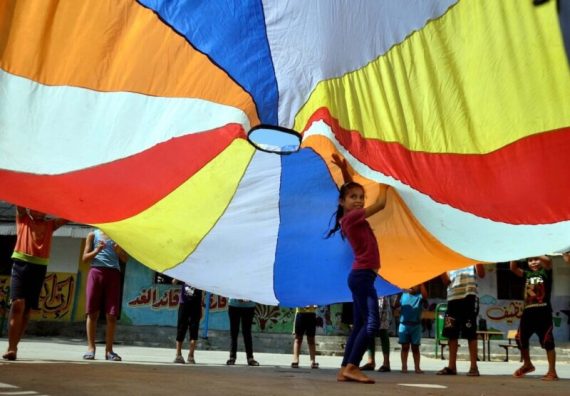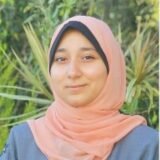A
t last, December came around, the month I had been keenly expecting. Now there was only one month left for my January birthday, and I eagerly wrote down some ideas for how to celebrate my 8th birthday with family and friends.
With my final exams to finish first, I was motivated to study well to have a relaxed and beautiful winter holiday. I was excited, too, to hear my parents’ words, “We’re not just celebrating your birthday, you know. We’re also celebrating how well you’ve done at school.”
The first trauma
On December 27, I finished the first exam and met my friend Amani, who used to walk home with me. We stopped at the door of the school to buy some sweets. It was a normal day.
During our walk home, the massive sound of bombardment suddenly shook the ground. A man started shouting that we all needed to run and hide “somewhere safer.” We were close to a gas station, which was extremely dangerous.
Everyone started running, terrified. Schoolchildren were shouting and trying to hide in the nearby stores and shops. Amani and I started crying. We were little and couldn’t understand what was going on, and here we were all alone in the middle of a nightmarish, deadly situation.
We rushed into one of the markets, following some students who were older than us. I still remember their faces. They, too, were terrified of the scenes they were experiencing: young children and men falling over on the streets, bombs falling from the sky like rain, everything being violently turned upside down at once.
Amani and I stayed behind, unable to look at or see what we were witnessing. We couldn’t believe what people were whispering about in sheer terror. We just kept closing our eyes and ears, and shaking.
It seemed impossible for us to get home safely with the explosions everywhere, a sky crowded with drones, and the awful roar of heart-stopping bombs.
A few minutes later, we moved to another shop, then another shop, then to a street we had never walked on. Trying to get home as fast as our legs could run, we finally made it.
I hugged Amani and asked her to take care of herself. When I walked into my home, my mom couldn’t believe her eyes. Finally, she could be assured that I was alive and well.
While trying to wipe my tears, she couldn’t hide her own feelings of fear and she cried. I had so many questions to ask her. But that day, I was not able to utter a single word.
Seconds later, my father and uncle came home. They were both in an unusual state, and their eyes were red. While worshiping at the mosque, they had inhaled tear gas. Every one of us was feeling distraught.
Hours later, my aunt finally knocked on the door. After she entered, she collapsed and told us that on her way home she’d seen a missile strike a house. She also described how she struggled to reach home after monitoring her students’ exams.
We were all trapped in a state of waiting without knowing what we should do next. Should we study for the next exam? Should we prepare for a sudden evacuation?
My mom tried hard to isolate my siblings and me from watching the news and from the outside world, but I couldn’t forget the pictures I’d seen by chance on TV of children injured or killed by the bombs.
Throughout this whole time, my heart kept beating wildly. I was shocked by how everything escalated so quickly. At the same time, I wasn’t really aware of the meaning of the grim moments we were living through.
I didn’t know it was just the beginning of a war, a long war that was going to destroy me, my dreams, my childhood, and my friends.
Near-death experience
The targets that Israel attempted to destroy that winter included not only the sites where freedom fighters might be found, but also residential towers, schools, mosques, homes, hospitals, animals, trees, markets, and everything that moved on the ground.
Living in a crowded neighborhood as we did, we prayed hard for it not to be bombed because a single Israeli missile would lead to the massacre of many neighbors. On December 29, it was the turn of the Aqel Mosque, which was separated from our house by one tiny street.
That chilly night, we were traumatized by a violent earthquake. The mosque had been bombed! We awoke terrified. I remember the sound of breaking concrete columns, the smell of artillery shells and fire. We cried and screamed inconsolably.
If we stayed inside amid the darkness and destruction, we’d be in great danger. But we’d also face terrible danger if we ventured out onto the street.
I was terrified of losing any of my family members, especially my younger sibling, who was coughing intensely and couldn’t breathe. We had no choice but to surrender to the possibility that we might die.
At one point, however, first responders showed up at our door to find out whether we were still alive.
We heard a paramedic shouting: “Al-Rantisi family! Hello! Is anyone in the house? Anybody injured? Anyone been martyred?”
“We’re all alive! Help us! We can’t breathe!” my father responded.
None of the responders could believe the miracle they saw: all of us alive, and nobody hurt by the broken glass and fallen walls.
My uncle came rushing to take us to his house. Our relatives experienced terrible panic when they heard the news that our neighborhood had been bombed. Hours went by before they were able to find out that we were alive.
Surviving guilt
Although my family and I survived, my childhood friends whose house was just three meters from the mosque were killed in that airstrike: Tahreer (18), Ekram (15), Samar (13), Dina (8), and Jawaher (4) Ba’alousha.
That was too much pain for me to experience. Whenever I remember that I have to continue living without them, I feel extremely sad.
The anger that raged inside me following my friends’ martyrdom affected me terribly. I hated myself, my ugly house, my gloomy neighborhood, my school, the feeling of helplessness, and Gaza.
There was another reason why I felt guilty: as the eldest sister of three siblings, I had to be responsible for them when my mom was not with us.
The war turned me into a child who stuck to her mom wherever she went. Even when the war was over, the trauma continued with me for years. I never allowed my mom to go anywhere without taking me with her.
Recommended
Harsh circumstances
We spent the rest of the war at my uncle’s house. They were terribly difficult days. We suffered from the lack of electricity, water, and cooking gas.
We were deprived of the ability to do simple things like take a shower, enjoy a warm evening, and wash our clothes.
On one occasion, I went upstairs with my mom to hand-wash clothes, and to our horror, we saw many Israeli warplanes launching missiles and bombs at homes. A thick, black smoke covered the sky, and the air was unbreathable.
When it was time to try to sleep, we gathered in one room. We wanted to close the windows to prevent suffocation from phosphorous gas, which we woke up inhaling.
Terrible though our situation was, at least we had my uncle’s house to stay in. Thousands of Gazans had to stay in schools when their homes were demolished. And even there they weren’t safe from Israeli bombing and shelling.
The war ended shortly afterwards, but the suffering has never ended. The real challenge began when we had to continue living despite all we’d been through.
While the world was celebrating the new year, Gaza was bleeding in pain.
At a time when all I wanted was to enjoy my childhood and celebrate my 8th birthday, I was mourning the loss of my friends. I felt much older than my years.





